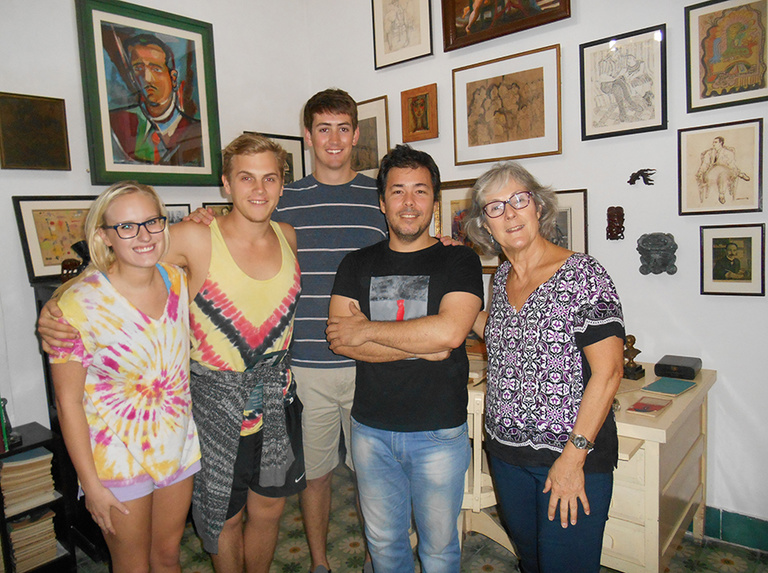By Adriana Méndez, guest column for the Iowa City Press-Citizen
This August marks the 30th anniversary of my arrival in Iowa City. I came as a young, rather doe-eyed, academic to take up a position at the University. Through bitterly cold winds, freezing ice, and many winters, I am proud to say I have survived. For I belong to a generation that a sociologist dubbed “masters of survival:” the daughters and sons of first-wave Cuban exiles who left the island after the onset of the 1959 revolution. Dubbed the “one-and-a-half-generation,” our talent or perhaps recklessness make us profoundly Cuban, and, at the same time, equally and proudly American: a balance of language, culture, and affect not easy to reach, but our fate just the same.

Méndez (far right) with a group of UI students on a study abroad trip to Cuba in January 2015.
There are not many of us in Iowa. The distance and difficulty of traveling to Cuba meant that, over the years, I did not have an opportunity to return to the country of my birth. Then, as if in a magic turn of fate, since 2012 I have had a number of opportunities of going back. In June, 2012 I went on a pilgrimage with New York City based artist Aurora de Armendi to search for the sculptures which Ana Mendieta carved in the caves at las Escaleras de Jaruco, a park outside Havana. Mendieta, one of the thousands of children sent alone to the United States under Operation Peter Pan in the early 1960s, arrived in Dubuque with her sister Raquel, and went on to become a pioneer of the earth/body art movement. Like Aurora, whom I proudly count among my students, Mendieta trained at the University of Iowa, and connected the deep earth of her adopted state to the waters, sand, and caves of her beloved island.
This month I recently returned on a trip to Cuba with my Iowa-born daughter, Juliana. We went to las Escaleras to search for Ana’s sculptures: carvings inspired by the female deities of the Taíno pantheon. The Taínos were Cuba’s original settlers, whom Columbus met back in October, 1492, when he stepped off the Pinta and the Santa María, and marveled at “the most beautiful land that human eyes have ever seen.”
Now that the first step toward restoring the historical ties between the U.S. and Cuba has been taken, Americans are, once again, eager to experience Cuba. I would like to share a unique travel opportunity with the people of Iowa, and invite them on a trip that ties together my personal history, the island’s natural beauty, and the warmth, humor, and hospitality that characterizes our people. In another welcome turn of fate, Citizens Ambassadors Program in Washington state has invited me to lead a People-to-People delegation in early December 2015 (December 4-13).
Our delegation will explore nature and conservation in today’s Cuba. We will tour key ecological sites including the Almendares River Project, the biosphere reserves at Zapata Swamp, Viñales, and las Terrazas. Please consult the program’s website to see the full itinerary.

Members of this delegation can collaborate with professional counterparts, network with organizations in the nature and conservation arenas, and connect with the Cuban culture in ways that most tourists never do.
We will have lectures on environmental history, pre-Hispanic archeology, and resource management from experts within Cuba. At las Escaleras, I will talk about Mendieta’s art and the Rupestrian Sculptures series. This trip will foster a true people-to-people dialogue, and includes sites “off the beaten track” like the biosphere reserve in Güanahacabibes peninsula on the western tip of the island.
Like Graham Greene’s Our Man in Havana (1958), we will also enjoy the sights and sounds of the city. As a Cuban-American, it would be an honor to have Iowans join me in this exciting delegation. I thank the Iowa City Press Citizen for giving me the opportunity to share this announcement with Iowans of all ages and persuasions. Feel free to contact me (Adriana Mendez) at: Adrianamendez1016@gmail.com, or directly to People to People Citizen Ambassador Programs by either email: citizens@peopletopeople.com. Or phone: 877-787-2000.
Adriana Méndez is a professor in the UI Department of Spanish and Portuguese.